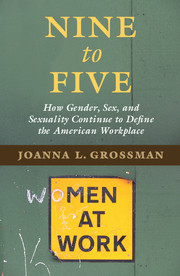Book contents
- Frontmatter
- Dedication
- Contents
- Foreword
- Acknowledgments
- Introduction
- PART I WHAT IS SEX DISCRIMINATION?
- PART II SEXUAL HARASSMENT
- 12 Workplace Affairs and Sexual Favoritism
- 13 Lolita at the Office
- 14 Sex Talk in the Writers’ Room
- 15 Sex Behind Bars
- 16 When the Supervisor Bullies Only Women
- 17 The Equal Opportunity Harasser
- 18 Periodontal Perils
- 19 Punishing Effeminacy
- 20 Late-Night Affairs with David Letterman
- 21 Why Herman Cain Has Not Been Able to Talk His Way Out of His Exploding Sexual Harassment Scandal
- 22 Why Hostile Environment Harassment Is a “Continuing Violation”
- 23 When Sexual Extortion Is Successful
- 24 The Consequences of Failing to Complain about Harassment
- 25 Who Is Responsible for Sudden, Severe Harassment?
- 26 Chinks in the Harassment Law Armor
- 27 Do Employer Efforts Prevent Harassment or Just Prevent Liability?
- 28 Who's the Boss?
- 29 Costly Mistakes
- 30 Hands Off the Merchandise
- PART III PREGNANT WOMEN AND MOTHERS AT WORK
- PART IV FEMALE BREADWINNERS AND THE GLASS CEILING
- Conclusion
- Notes
- Index
12 - Workplace Affairs and Sexual Favoritism
from PART II - SEXUAL HARASSMENT
Published online by Cambridge University Press: 05 May 2016
- Frontmatter
- Dedication
- Contents
- Foreword
- Acknowledgments
- Introduction
- PART I WHAT IS SEX DISCRIMINATION?
- PART II SEXUAL HARASSMENT
- 12 Workplace Affairs and Sexual Favoritism
- 13 Lolita at the Office
- 14 Sex Talk in the Writers’ Room
- 15 Sex Behind Bars
- 16 When the Supervisor Bullies Only Women
- 17 The Equal Opportunity Harasser
- 18 Periodontal Perils
- 19 Punishing Effeminacy
- 20 Late-Night Affairs with David Letterman
- 21 Why Herman Cain Has Not Been Able to Talk His Way Out of His Exploding Sexual Harassment Scandal
- 22 Why Hostile Environment Harassment Is a “Continuing Violation”
- 23 When Sexual Extortion Is Successful
- 24 The Consequences of Failing to Complain about Harassment
- 25 Who Is Responsible for Sudden, Severe Harassment?
- 26 Chinks in the Harassment Law Armor
- 27 Do Employer Efforts Prevent Harassment or Just Prevent Liability?
- 28 Who's the Boss?
- 29 Costly Mistakes
- 30 Hands Off the Merchandise
- PART III PREGNANT WOMEN AND MOTHERS AT WORK
- PART IV FEMALE BREADWINNERS AND THE GLASS CEILING
- Conclusion
- Notes
- Index
Summary
When a married supervisor conducts long-standing, concurrent affairs with three female subordinates at work and grants them professional favors over more deserving employees, does it constitute unlawful sexual harassment?
In Miller v. Department of Corrections, the California Supreme Court has held that it does, despite a long-standing reluctance by courts to recognize claims of so-called sexual favoritism.
THE PLAINTIFFS’ ALLEGATIONS ABOUT WORKING CONDITIONS AT THE VALLEY STATE PRISON FOR WOMEN
The case was brought by two former employees at the Valley State Prison for Women (VSPW) – Edna Miller, a correctional officer, and Frances Mackey, a records manager who passed away while the litigation was pending. Miller and Mackey alleged that they were subjected to discrimination and harassment as a result of the chief deputy prison warden's multiple workplace affairs and related conduct.
Although the case involved numerous allegations, the crux of the complaint is its allegation that the deputy warden, Lewis Kuykendall, openly carried on three affairs with female employees at the prison (Bibb, Patrick, and Brown), all subordinate to him, and granted those women undeserved privileges and promotions because of his relationship with them. At the same time, the suit alleges, female employees who complained about these relationships were punished, and retaliated against, for their objections.
Although the facts of the case are too numerous and complicated to recount in detail, a few notable examples will provide a sense of the ways in which, according to the plaintiffs’ allegations, these sexual relationships pervaded the workplace and disadvantaged those not involved in them.
When Kuykendall was transferred from another facility to VSPW, the plaintiffs allege that he gradually had all three of his paramours transferred so they would once again be working under him. Once there, the paramours all allegedly benefited in tangible ways from their relationship with Kuykendall.
One paramour, for example, was allegedly granted a promotion over the objection of the committee appointed to make the decision because Kuykendall ordered them to “make it happen.” A second paramour was allegedly permitted to report directly to Kuykendall in lieu of her immediate supervisor. A third was allegedly given a series of promotions over more qualified applicants, and, according to plaintiffs, remarked that Kuykendall had no choice but to give them to her lest she “take him down” by revealing “every scar on his body.”
- Type
- Chapter
- Information
- Nine to FiveHow Gender, Sex, and Sexuality Continue to Define the American Workplace, pp. 78 - 82Publisher: Cambridge University PressPrint publication year: 2016

